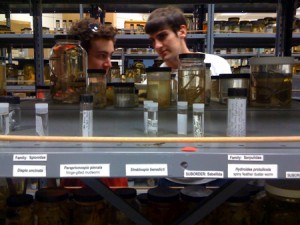Abigail Horton ’11, Wesleyan Summer Session Teaching Assistant, describes her experiences in Louisiana.
The students will present an open rehearsal of their works in progress, which have developed out of their research in the Gulf, on Friday, July 1, 2011, from 1pm to 3pm in Woodhead Lounge (Exley Science Center).

Seven students of the class The Deepwater Horizon Tragedy: A Scientific and Artistic Inquiry traveled to the Gulf Coast of Louisiana to explore the Deepwater Horizon oil spill almost a year after the spill occurred. The class was structured as an investigation – a scientific, artistic, and human investigation into Louisiana’s relationship with the oil industry, how it led up to the Deepwater Horizon tragedy, and how the people of Louisiana deal with it a year after.
The students interviewed over twenty people who were involved with the oil spill: An oysterman whose ninety-year-old family business was wiped out by the governor’s actions during the oil spill. A woman who would abandon her beloved Louisiana in order to save it. One biologist who concludes that we have turned the page since the spill, and a different biologist whose experiments conclude that there are lasting effects from the oil spill. The politician who dealt directly with President Obama during the spill. The first female oilrig worker in Louisiana, and many more passionate, interesting and conflicting voices of the story that is Louisiana, the oil industry, and the oil spill.
The class explored the southern-most rural areas of Louisiana and went to the coastline that was first affected by the spill. We talked to professors and experts at Nicholls State College and Louisiana State University. In boats, the students went out to the wetlands where oil is still caked on the coastal sands, witnessing first-hand the power of the substance to destroy land. Out in the Gulf, we saw the clean-up crews still slowly working to clean the wetlands. The class got into the Gulf and helped professors from the University of New Orleans troll for shrimp and fish to take data on the ecosystem. The class explored New Orleans, and enjoyed the Gulf seafood that Louisianans are so passionate about. Through all of out explorations, we learned how deeply embedded the oil industry is with Louisiana’s history and culture and the complexity of the story.
Perhaps one of the most powerful moments for the class was when we met with a New Orleans-based artist and activist. Her art has examined the environment, the oil spill, and how nature is trying to recover. She looks at the fragility of the landscape and humans’ role in shaping that. She told the students, “make art about what pisses you off and what blisses you out.” This artist demonstrated to the students how powerfully art can communicate the environmental issues taking place along the Gulf coast, exactly what this class is striving for.
As the teaching assistant for this course, I was able to watch the students delve into this subject with curiosity and sensitivity. As the trip went on, the students became more involved and invested and came to understand the intricacies of the science, human, and political sides of the story. It was an incredible experience for all involved and it is clear to me the students’ dedication to telling the story of the oil spill with accuracy and thoughtfulness.



